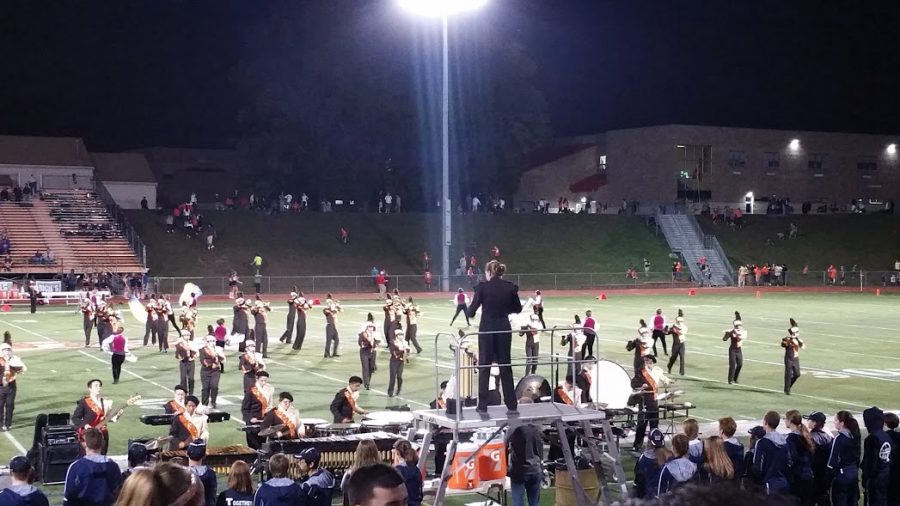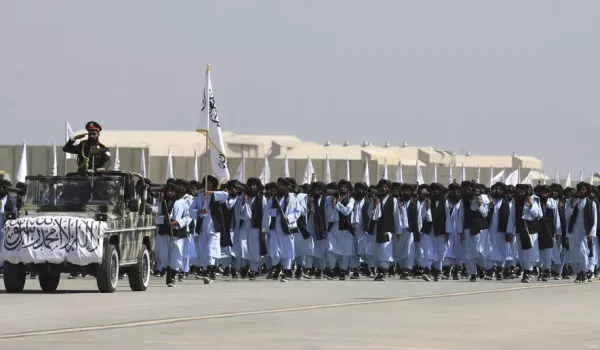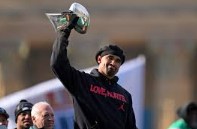The Instrumental Question: Is Marching Band a Sport?
The Cherokee marching band under the Friday night lights
Behind the scenes of most major high school sporting events there lies a marching band. The activity is primarily considered a part of the arts but as it has evolved, its parallels with “traditional” sports have been noted, and a controversial topic has risen: is marching band a sport?
Prior to joining marching band, I, like many others, would have said it is not a sport, but two years of involvement in the activity has changed my outlook. The Oxford English Dictionary defines a sport as “an activity involving physical exertion and skill in which an individual or team competes against another or others for entertainment”. Marching band is a sport because it requires physical exertion, is a competitive activity, and has a professional league just as sports do while still holding its uniqueness as a form of art.
In the Cherokee Marching Band, we do a lot more than just play in the stands. We perform a field show. We rehearse the show from June until the end of October. We memorize about ninety coordinates in order to make the correct form in addition to memorizing seven minutes of intricate music. Performing requires talent and focus as we need to play with our best musicality and demands constant thinking about the greater picture of the overall performance. Playing a wind instrument also requires vast amounts of air that can be strenuous to do while moving at 160 beats per minute. A study conducted on a Drum Corps International—the equivalent of major league marching band—drummer found that his heart rate “was more than 200 beats per minute, and his oxygen intake was 13 to 14 times higher than his resting metabolic rate while performing the drill on the field”. This is comparable to professional soccer players who reach their maximal heart rate between eighty and ninety percent of the time during a match. Marching band combines the physical rigor of sports and the intricate art form of music, making it a rigorous activity, while still remaining suitable for a wide array of people.
Our marching band also performs outside Cherokee in order to compete against other bands, exactly as other sports programs perform. We are then judged on various aspects, such as visuals, individual music, music ensemble, color guard and overall effect. Cherokee is well known for its sports and marching band, as the football team and marching band are both recent state champions. Although winning is thrilling, performing as a band is more than receiving a trophy; it’s about portraying the show’s message to the audience for their entertainment. What makes band competitions unique is that bands are only rewarded, not penalized at competitions. “You don’t have to make, hurt, or beat other bands in order to win” said Cherokee’s Band Director, Mr. Lynch.
The meaning of “sports” extends to more than just a definition. Sports are also about dedication, achieving goals, and unity. While I’m speaking on behalf of Cherokee’s Marching Band, I have seen a similar culture in other marching bands. We all work together to entertain the audience through discomfort and pain. We push our limits and try to improve with every single practice. And most importantly, we are united through our similar mindset and support each other and our programs through wins, or losses. Marching Band is more than the background music at football games. It’s a sport like any other, but what makes it unique is that everyone contributes equally since, according to Mr. Lynch, “there’s no levels in band. Everyone plays varsity.” Cherokee softball player and mellophone section leader Carly Morton agrees, stating “no one ever sits the bench.”












